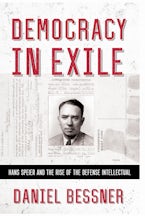"Speier began his academic career studying the sociology of knowledge, and after he arrived in the United States, he directed the US government's propaganda effort against Germany. The debates recounted in Bessner's biography between Speier and other officials over how to develop effective campaigns are particularly fascinating in the context of contemporary worries about information warfare." Foreign Affairs
"Democracy in Exile is directly relevant to a number of contemporary debates, not just about foreign policy but on the nature of politics itself." - Los Angeles Review of Books
"Bessner's archival work has turned up many gems." - The Globe Post
"A revealing look at a thinker burned by populist upheaval who worried that 'man's nature makes the realization of the good order impossible.'" - Shepherd Express
"An honest and impressively compiled reminder to policy-oriented givers, grant recipients, and policymakers about some of the concerning anti-democratic roots of modern establishment philanthropy - and its understanding of the relationship between knowledge and power." - Real Clear Books
"Bessner writes about his subject with sympathy and insight... Democracy in Exile should also be read by those who fear that democracy is again under threat all over the world." - Technology and Culture
"This book skillfully navigates between an argument for Speier's historical importance and a critique of his ideas." - German History
"Bessner's Democracy in Exile, therefore, stacks up with the best in contemporary history that is powerfully relevant to current debates concerning foreign policy. The book shows how and why it is important to think carefully about democracy and the role scholars and intellectuals contribute to its survival." - H-Net
"Bessner's biography of Speier is an excellent case study of a transatlantic crossing linking Europe's interwar crises with America's permanent national security state." - American Historical Review
"A vital contribution and vivid portrait of Hans Speier." - Journal of American History

